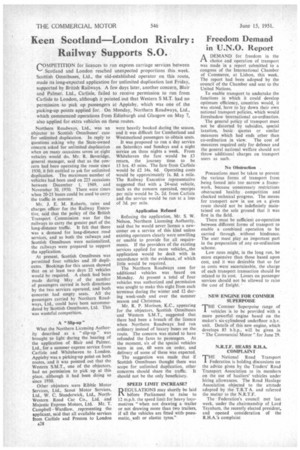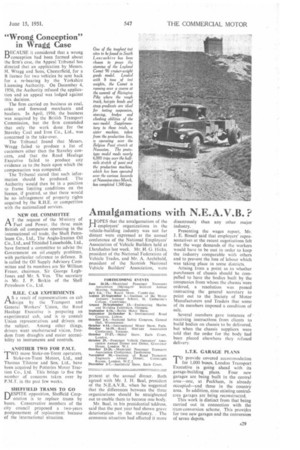Keen Scotland—London Rivalry: Railway Supports S.O.
Page 30

Page 31

If you've noticed an error in this article please click here to report it so we can fix it.
COMPETITION for licences to run express carriage services between
Scotland and London reached unexpected proportions this week. Scottish Omnibuses, Ltd., the old-established operator on this route, made its long-expected application for unlimited duplication last Friday, supported by British Railways. A few days later, another concern, Blair and Palmer. Ltd., Carlisle, failed to receive permission to run from Carlisle to London, although it pointed out that Western S M.T. had no permission to pick up passengers at Appleby, which was one of the picking-up points applied for. On Monday, Northern Roadways, Ltd., which commenced operations from Edinburgh and Glasgow on May 7, also applied for extra vehicles on these routes.
Northern Roadways, Ltd., was an objector to Scottish Omnibuses' case for• unlimited duplication. In reply to questions asking why the State-owned concern asked for unlimited duplication whcn on many occasions seven or eight vehicles would do, Mr. R. Beveridge, general manager, said that as the concern had been operating the route since 1930, it felt entitled to ask for unlimited duplication. The maximum number of vehicles had been used on 223 occasions between December I, 1949, and November 30, 1950. There were times when 20-25 buses could be used to carry the traffic in summer.
Mr. J. E. M. Roberts, rates and charges officer for the Railway Executive. said that the policy of the British Transport Commission was for the railways to tarry the greater part of the long-distance traffic. It felt that there was a demand for long-distance road services, and as both the railways and Scottish Omnibuses were nationalized, the railways were prepared to support the application. At present, Scottish Omnibuses was permitted four vehicles and 10 duplicates. Bookings for this season showed that on at least two days 22 vehicles would be required. A check had been made during May of the number of passengers carried in both directions by the two services operated, and both concerns had empty seats. All the passengers carried by Northern Roadways, Ltd., could have been accommodated by Scottish Omnibuses, Ltd. This was wasteful competition.
A " Slip-up " What the Northern Licensing Authority described as a "slip-up" was brought to light during the hearing of the application of Blair and Palmer, Ltd., for a summer express service from Carlisle and Whitehaven to London. Appleby was a picking-up point on both routes, and it was pointed out that the Western S.M.T., one of the objectors, had no permission to pick up at this place. although it had been doing so since 1930.
Other objectors were Ribble Motor Services, Ltd., Scout Motor Services, Ltd., W. C. Standerwick, Ltd., NorthWestern Road Car Co., Ltd. and Majestic Express Motors, Ltd. Mr. T. Campbell -Wardlaw, representing the applicant, said that all available services from Carlisle and Preston to London
a28
were heavily booked during the season, and it was difficult for Cumberland and Westmorland passengers to obtain seats.
It was proposed• to run a day service on Saturdays and Sundays and a night service on three nights a week. From Whitehaven the fare would be £3 return, the journey time to be 13 hrs. 45 mins. The fare from Carlisle would be £2 14s. 6d. Operating costs would be approximately Is. 8d. a mile. The Railway Executive representative suggested that with a 24-seat vehicle, such as the concern operated, receipts per mile would be 2s. 2d. from Carlisle and the service would be run at a loss of 3d. per mile.
Application Refused Refusing the application, Mr. S. W. Nelson, Northern Licensing Authority, said that he would never licence a newcomer on a service of this kind unless existing operators clearly were unwilling or unable to provide for all requirements. If the providers of the existing services applied for more vehicks„the application would be dealt with in accordance with the evidence, of which little would be required.
The Northern Roadways case for additional vehicles was heard on Monday. At present a total of four vehicles was authorized and permission was sought to make this eight from each terminus during the winter and 12 during week-ends and over the summer season and Christmas.
Mr. R. P. Morison, K.C., appearing for the objectors, Scottish Omnibuses and Western S.M.T., suggested that there had been a breach of the licence when Northern Roadways had run ordinary instead of luxury buses on the route. The concern was stated to have refunded the fares to passengers. At the moment, six of the special vehicles were in use, 60 were on order, and delivery of some of these was expected.
The suggestion was made that if Scottish Omnibuses thought there was scope for unlimited duplication, other concerns should share the traffic. It should not be the only beneficiary.
SPEED LIMIT INCREASE?
REGULATIONS may shortly be laid before Parliament to raise to 12 m.p.h. the speed limit for heavy locomotives "when not drawing a trailer or not drawing more than two trailers, if all the vehicles are fitted with pneumatic, soft or elastic tyres."
Freedom Demand in U.N.O. Report
DEMAND for freedom in the choice and operation of transport was made in a report submitted to a congress of the International Chamber of Commerce, at Lisbon, this week. The report had been adopted by the council of the Chamber and sent to the United Nations.
To enable transport to undertake the functions in which it could develop optimum efficiency, countries would, it was stated, have to lay down their own national transport policies, which would foreshadow international co-ordination.
The general policy of transport must not be distorted by subsidies, special 'taxation, basic quotas or similar measures which had ends other than co-ordination in view. The cost of measures required only for defence and the general national welfare should not throw additional charges on transport users as such.
No Obstruction .
Precautions must be taken to prevent the various forms of transport from being forced into too narrow a framework, because unnecessary restrictions obstructed healthy, competition and checked technical progress. The means for transport now in use on a given route should not be indefinitely maintained on the sole ground that it was first in the field.
There must be sufficient co-operation between different forms of transport to enable a combined operation to be carried through without hindrance. The user must play an important part in the preparation of any co-ordination scheme.
Low rates might, in the long run, be more expensive than those based upon cost, and it was desirable that so far as costs were ascertainable, the charge of each transport transaction should be related to its cost. Losses on passenger services should not be allowed to raise the cost of freight. '
NEW ENGINE FOR COMMER SUPERPOISE
THE Comrner Superpoise range of vehicles is to be provided with a more powerful engine based on the maker's six-cylindered underfloor o.h.v. unit. Details of this new engine, which develops 85 b h.p., will be given in
The Commercial Motor" for June 29.
N.R.T.F. HEARS R.H.A. COMPLAINT
THE National Road Transport Federation is holding discussions on the advice given by the Traders' Road Transport Association to its members on the use of hauliers' vehicles under hiring allowances. The Road Haulage Association objected to the attitude adopted by the T.R.T A. and referred the matter to the N.R.T.F.
The ' Federation's council met last week, under the chairmanship of Lord Teynham, the recently elected president, and opened consideration of the R.H.A.'s complaint
"Wrong Conception" in Wragg Case
BECAUSE it considered that a wrong conception had been formed about the firm's case, the Appeal Tribunal has directed that an application by Messrs. H. Wragg and Sons, Chesterfield, for a 13 licence for two vehicles be sent back for a re-hearing by the Yorkshire Licensing Authority. On December 4, 1950, the Authority refused the application and an appeal was lodged against this decision.
The firm carried on business as coal, coke and firewood merchants and hauliers. In April, 1950, the business was acquired by the British Transport Commission, but the firm contehded that only the work done for the Staveley Coal and Iron Co., Ltd., was concerned in the take-over.
The Tribunal found that Messrs. Wragg failed to produce a list of customers other than the Staveley concern, and that the Road Haulage Executive failed to produce any evidence as to.the basis upon which the compensation was computed. The Tribunal 'stated that such information should be produced. The Authority Would then be in a position to frame limiting conditions on the licence, if granted, so that there would be no infringement of property rights acquired by the R.H.E. or competition with the nationalized services.
NEW OIL COMMITTEE
AT the request of the Ministry of Fuel and Power, the three main British oil companies operating in the international oil trade, the Shell Petroleum Co., Ltd., The Anglo-Iranian Oil Co., Ltd., and Trinidad Leaseholds, Ltd., have formed a committee to advise the Government on oil ,supply problems, with particular reference to defence. It is called the Oil Supply Advisory Committee and its members arc Sir William Fraser, chairman, Sir George LeghJones and Mr. S. Vos. The secretary is Mr. I. P. Berkin of the Shell Petroleum Co., Ltd.
R.H.E. CAB EXPERIMENTS
AS a result of representations on cab design by the Transport and General Workers' Union, the Road Haulage Executive is preparing an experimental cab, and is to consult Union representatives and drivers on the subject. Among other things, drivers want unobstructed vision, freedom from draughts and easier accessibility to instruments and controls.
. ANOTHER TWO FOR P.M.T.
TWOmore Stoke-on-Trent operators. Stoke-on-Trent Motors, Ltd., and Thomas Tilstone and Son. Ltd., have been acquired by Potteries Motor Traction Co., Ltd. This brings to five the number of concerns taken over by P.M.T. in the past few weeks.
SHEFFIELD TRAMS TO GO
DESPITE opposition, Sheffield Corporation is to replace trams by buses. Conservative members of the city council proposed a two-years postponement of replacement because of the international situation.




























































































